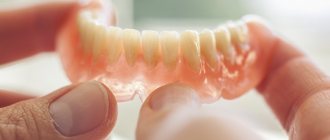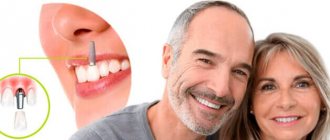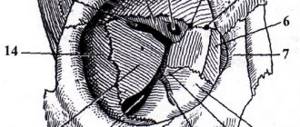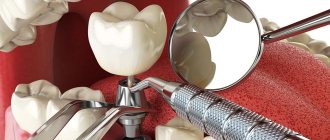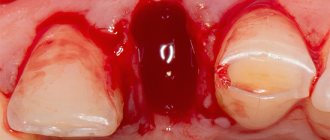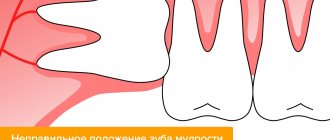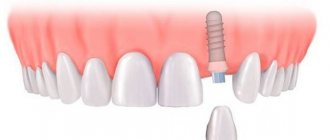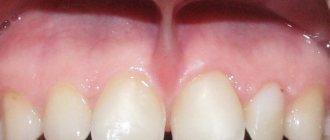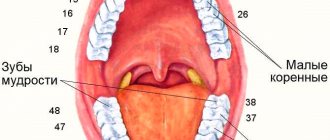6021
The period of adaptation to a denture is not the most pleasant time, but the comfort of further use of “second teeth” depends on whether the doctor’s recommendations are followed during the process of adaptation.
What are the ways to reduce discomfort, restore diction and chewing function? Why does salivation change and how long does it take to get used to removable dentures?
Reducing pain
The very first negative feeling that occurs after installing a removable denture is a feeling of pain. The gums, which have become accustomed to external stress, ache, and they hurt quite severely - often you even have to take painkillers.
In the first days after dentures, severe discomfort is felt not only when eating, but also when there is no pressure on the false teeth. Doctors recommend not torturing yourself and taking any painkiller as needed.
, available for purchase without a prescription - Nurofen, Panadol or Baralgin.
You need to be prepared for pronounced unpleasant sensations while chewing - the denture, in contact with the gums, will rub them strongly. You will need to rebuild your usual diet, excluding all solid foods from it - crackers, nuts, sweets
.
Soft food should be cut into small pieces and chewed carefully. Such precautions must be observed during the first month while the denture is rubbing into the gums.
In the future, you need to return to the original diet, adding solid food to the foods you eat in small quantities.
Important: decreased appetite is a common occurrence after installation of a removable denture. There is no need to be led by the desire to skip meals - you need to eat in the same amount as before prosthetics.
The more chewing load the new teeth bear, the faster they will rub against the gums.
Dentists, as an effective way to reduce pain, recommend doing self-massage of the gums. It is performed in the following sequence:
- Wash your hands with antibacterial soap;
- Stroke the gums in a circular motion, gradually moving to the inflamed areas;
- Having become accustomed to stroking, increase the pressure;
- Covering the gum with your thumb and forefinger, make vertical movements from bottom to top.
The entire massage should last 3-4 minutes
, after which the pain will decrease for some time. It is done as needed - there are no restrictions.
Types of removable dentures: how to get used to each of them
Bridges are the most common type of removable dentures installed in patients who have partially lost teeth in the dentition. They allow you to restore the function of up to 4 teeth in a row. In most cases, they do not cause significant discomfort to the owner, and complete adaptation occurs within a few days or weeks.
Plate dentures are a universal type of denture that can be installed for both partial and complete loss of teeth. Unlike bridge analogues, they require a longer period of adaptation, which is why their owners most often ask the question of how to get used to removable dentures. The design of plate dentures provides for the presence of a base and artificial teeth that restore the mechanical and aesthetic function of the dentition.
The period of adaptation to plate dentures directly depends on the type of material and compliance with the doctor’s recommendations. If the base is hard plastic, addiction will take longer than with a fairly soft nylon base.
Partially removable dentures are special orthopedic structures installed on the jaw with two or more natural teeth. Their base is made of medical plastic (acrylic, clasp, nylon, polyurethane), as well as metal fixing elements. They can act as either a temporary or permanent solution to replace tooth function. The adaptation period is comparable to plate analogues.
In order to quickly get used to wearing removable dentures, follow a few simple recommendations:
- Retract and press your lips together, tense your cheeks by puffing out (exercises should be done 3-4 times a day);
- Train the correct pronunciation of words at least 4 times for 15 minutes a day, not paying attention to the existing discomfort;
- Read books, newspapers, news on the Internet aloud;
- In the initial stages of addiction, try to avoid eating solid foods;
- Try not to remove removable dentures for a long period (during the first month after installation).
What to do when rubbing
At first, the denture will interfere and rub, there is nothing surprising in this - you need to get used to a foreign object in the mouth.
However, if severe pain does not decrease after the first 2-3 days, you should go to the doctor. There may be two reasons for this problem:
- Incorrectly adjusted dimensions of the prosthesis;
- Sensitive gum tissue.
First of all, the doctor will check the size of the prosthesis; if errors were made during its manufacture and it is too small, the prosthesis will be adjusted or replaced with a new one.
If you have highly sensitive gums, even properly sized removable teeth will irritate the tissue in contact with them. Diet helps solve this problem; you need to exclude:
- all spicy foods;
- food with a viscous, sticky consistency - pastry creams, condensed milk;
- fatty fried foods.
After each meal, the mouth should be rinsed with boiled water or chamomile infusion.
If this does not give the desired results, it makes sense to use special retaining spacers that are placed between the gums and removable teeth. They reduce pressure and prevent friction between two surfaces.
Abrasions and bruises should not be allowed to appear on the gums - when food debris gets into the damaged tissue, foci of infectious inflammation are formed, which can lead to serious trouble.
You will find a detailed description of Corega tablets for cleaning dentures in a separate article.
Here are examples of prices for tooth inlays under a crown.
Here: https://www.vash-dentist.ru/protezirovanie/nesemnyie-p/mostyi/opisanie-razlichnyih-vidov-zubnyih.html - the types of dentures - bridges - are described in detail.
Proper care of the prosthesis for quick adaptation
Proper care of your removable denture will help speed up the process of getting used to it. However, in addition to standard hygiene procedures, you will have to master a few more rules:
- rinsing the product after each meal: patients with removable dentures need to rinse not only the mouth cavity, but also the denture itself every time after a meal. To do this, just rinse it under running water,
- regular cleaning of the structure twice a day: every morning and before bedtime, the product should be cleaned with a brush and paste, the choice of which directly depends on the material from which the prosthesis is made. Usually soft brushes with antibacterial pastes without abrasive substances are used,
Cleaning the prosthesis - use of special solutions: the orthopedic system requires additional disinfection, for which experts recommend the use of special pharmaceutical products. Most often they come in the form of soluble tablets, each containing approximately 150 ml of water. The prosthesis must be placed in a container with the prepared solution for 15 minutes. This procedure must be carried out once a week.
Following these simple rules and tips will help you quickly get used to a removable denture with a palate, a clasp design, or any other model of orthopedic device. And in no case should you endure acute pain, because it usually signals that the structure was made or installed incorrectly.
Video review from a patient about prosthetics for all teeth using the all-on-6 technology. New smile in 3 days!
- Abadzhyan V.N. The influence of complete removable dentures on the mucous membrane of the prosthetic bed of patients, 2003.
Restoring chewing function
You need to be prepared for the fact that with new teeth you need to relearn how to bite and chew food
, and the meal itself will last much longer at first.
You will have to forget about hard and sticky food. Bite a little at a time - do not forget that even an ordinary bun, with which your mouth is stuffed to the eyeballs, will turn into a sticky mass that sticks to your teeth during the chewing process.
It is necessary to understand that the new incisors are prosthetic teeth, and do not try to bite off hard foods with them until the discomfort disappears and the soft tissues stop rubbing.
You need to chew food evenly on each side of the mouth, this will help distribute the load on the gums and reduce pain.
The ideal food for developing chewing function is finely chopped apples.
. They have sufficient rigidity and moderate hardness, which allows you to practice chewing without fear of damaging your gums or the denture itself.
Solving problems with increased or decreased salivation
Adaptation to artificial teeth is a purely individual process, the features of which differ for each person. This is especially true for the problem of salivation.
Some patients complain that their mouth is constantly dry, others, on the contrary, that saliva is secreted in excessive quantities.
It’s worth noting right away that this problem is natural and you shouldn’t be afraid of it. Increased salivation is a standard reaction of the body to an irritant, which is a prosthesis placed in the oral cavity.
.
Within two to three weeks after the installation of new teeth, salivation will return to normal on its own.
To reduce discomfort during the adaptation process, doctors recommend drinking water more often - this can effectively eliminate dry mouth: you need to take a small sip of water every time an unpleasant symptom appears.
To reduce salivation, you need to rinse your mouth with a light salt solution, for the preparation of which half a teaspoon of salt is diluted in a small glass of water. The problem of salivation will be solved for 40-50 minutes, after which the rinsing will need to be repeated.
Solving diction problems
After installing a prosthesis, all people have a lisp - this is a fact that cannot be avoided. However, a lisp can be tolerated during the first weeks of getting used to artificial teeth, but in the future its presence is considered an abnormal phenomenon.
.
To prevent a lisp from becoming a constant companion, you need to perform daily exercises to restore diction:
- Read aloud
- measuredly, slowly. You should devote 20-30 minutes to the procedure per day. Pronounce words clearly and emphasize problematic sounds; - Repeat tongue twisters
- you don’t have to pronounce them quickly, the main thing is to repeatedly practice the pronunciation of words and sounds that are difficult to learn.
Repeating long words out loud with alternating vowels and consonants helps to restore diction well.
- “plane crash”, “defense capability”, etc.
To train the pronunciation of voiceless sounds “r”, “s”, “sh”, you need to focus on words where they are repeated: “crazy”, “protecting”, “ruberoid”. Write down 20-30 of these words on paper and work with them after completing 20 minutes of reading the book.
The advantages and disadvantages of ceramic dental crowns are described in our review.
This article provides examples of prices for nylon dentures.
Follow the following link: https://www.vash-dentist.ru/protezirovanie/osobennosti-zubov-pri-ih-polnom-otsutstvii.html - read about dental prosthetics in the absence of teeth.
Returning the taste of food
The problem of loss of taste in food is typical for 30-35% of people with removable dentures.
. Deterioration in taste sensations is especially common when using budget products, individual elements of which are made of metal.
The problem can be solved by an appropriate psychological attitude - you should not try to swallow food and finish the meal as quickly as possible; on the contrary, it is better to slowly chew each piece of food and try to feel its taste.
At first, this activity will seem meaningless and strange - however, during such training, in 2-3 weeks the taste buds will become so sensitive that the ability to notice new shades of taste even in already familiar food will appear.
It is worth noting that the installation of a denture in most cases has a positive effect on a person’s nutritional culture - getting used to healthy food in the process of adaptation, the majority retain this useful habit for the rest of their lives.
Intolerance to removable dentures
The period of adaptation to removable dentures is conventionally divided into several phases. Almost everyone who is forced to use false teeth goes through these phases:
- The location phase begins when the structure is initially installed. The patient perceives the denture as a foreign body in the mouth. The inability to forget about the prosthesis in the oral cavity leads to a gag reflex, impaired diction, and tension in the muscles of the cheeks and lips.
- The primary inhibition phase immediately follows the positioning phase and lasts up to 5 days. Most owners of removable dentures notice that during this period normal salivation is restored, the lisp goes away, the muscles of the lips and cheeks return to their natural state (we recommend reading: how and how is excessive salivation treated?). The gag reflex decreases.
- The phase of complete inhibition is characterized by “excessive” habituation to the prosthesis. Now discomfort is felt not from the presence of the structure, but when the prosthesis is removed. The phase begins in the period from 5 to 33 days from the installation of the structure.
READ ALSO: how to care for removable dentures at home?
The next phase is complete adaptation. Chewing function, swallowing, and diction are restored in full. However, in some cases such favorable developments do not occur. A phenomenon occurs that is called intolerance. Its symptoms are:
- erythema,
- burning,
- local pain on the surface of the mucosa or dull in depth,
- persistent disturbances in taste, all food seems to contain plastic or metal.
The cause of intolerance to the prosthesis is often an allergic reaction to the material from which the structure is made. Mechanical irritation caused by poor manufacturing or poor fit also causes the patient to refuse to wear a prosthesis. The cause of discomfort may be microbial or fungal infection, as well as a disruption of the immune system or the mental state of the patient.
What to do if adaptation is delayed?
The normal period of getting used to a denture, if it is rigidly fixed on your own teeth, is 2-3 weeks.
. If the prosthesis rests on the gums, the adaptation period increases to six months.
At the same time, getting used to dentures on the lower jaw takes longer than to artificial teeth on the upper jaw, since the structure is constantly exposed to food pressure and shifts during jaw movements during chewing and during conversation.
The adaptation time depends on two main factors:
- the structure of the jaw
affects the tendency of the prosthesis to shift and fall out; - The sensitivity of the gums
determines how much tissue irritation will occur when the structure shifts.
If the discomfort and discomfort have not changed several weeks after installation of the prosthesis, it makes sense to use special adhesive creams to fix the prosthesis on the jaw.
Corega cream and President cream have proven themselves well; they reliably hold the denture on the gums in any conditions, minimize friction and, as a result, reduce pain and irritation of soft tissues.
The features of the period of getting used to a removable denture are quite specific - you will need to adhere to many rules, limit yourself in food, pay attention to training diction and chewing.
Carefully following all the recommendations given in the article promotes quick and painless adaptation, as a result of which it is easy to get used to the prosthesis and eventually forget about its existence.
Basic rules of addiction
A new denture often rubs and can injure the gums, and indeed all the mucous membranes of the oral cavity. In such situations, you should consult a doctor as soon as possible to adjust the design. How long it takes to get used to dentures often depends on how responsibly you take the adaptation process. Therefore, it is also important not to forget about the use of special ointments and creams designed to reduce inflammation and help get used to the new denture in the shortest possible time. Below are valuable recommendations that will help not only speed up, but also facilitate the adaptation period:
- psychological comfort: to make it easier to get used to a denture, it is important to choose the right shape and materials at the very beginning. If the patient has doubts about one option or another, but the doctor insists on a specific choice, then serious problems may subsequently arise, associated specifically with psychological discomfort,
Dentures on teeth - development of diction: any orthopedic system inevitably affects the quality of speech, but in order to better and faster get used to the denture, in the first few days it is recommended to perform special speech therapy exercises and repeat tongue twisters. You also need to read aloud to get used to the pronunciation of individual sounds again. At the same time, you can even put nuts or a few candies in your mouth (though it is better if they are sugar-free). Usually diction is restored within a few days, but it all depends on the model and thickness of the structure,
- getting used to chewing loads: in order to get comfortable getting used to the upper or lower removable denture, at first you should treat artificial teeth with care and try to chew food carefully. Preference should be given to softer products, and the chewing load can be gradually increased,
Eating soft foods
“I read on the Internet about how much it takes to get used to dentures, and somehow I even got inspired. Everyone wrote that the discomfort should go away in a couple of days, but in my case this was not the case! I suffered for more than a week with a new nylon prosthesis. Moreover, the doctor promised that with him adaptation would be easy and quick. At first it was simply impossible to chew! I had to go to a follow-up appointment to get the correction done. Before this, the hooks rubbed and scratched my gums a lot. Now, fortunately, everything is fine.”
Natalya K., Moscow, from correspondence on the woman.ru forum
- gum massage: for proper adaptation to dentures, you should regularly massage your gums, which effectively stimulates blood circulation in the tissues and helps strengthen the gums. In addition, massage treatments are excellent for pain relief,
- preventive rinses: decoctions of medicinal herbs such as chamomile or, for example, sage will help strengthen the gums, prevent the development of irritation, and also carry out high-quality disinfection of injured tissues. Usually the procedure is repeated no more than three times a day,
Chamomile decoction - combating the gag reflex: to cope with the urge to vomit, you can use the technique of deep breathing through the nose. Peppermint candies and saline rinses work well for this task. Experts advise trying to switch your attention, for example, to reading a book or watching an exciting movie. Discomfort and unpleasant sensations should go away in about a week,
“Two years ago I installed an Acry Free prosthesis made of soft plastic. The doctor promised a quick and painless adaptation, but in fact I was faced with a terrible problem - I began to feel very sick every time I tried to put the device back into my mouth after the next cleaning. This nightmare lasted for about two weeks, and then gradually began to pass. Now I don’t feel any discomfort at all, but I remember those first few weeks with horror.”
Peter, 43 years old, excerpt from a forum post
- leave the denture in the mouth overnight: removable appliances are usually removed at night. However, to shorten the adaptation period, it is recommended to leave the denture in the mouth while sleeping.
According to E. Pitters, a professor in the Department of Dentistry at the University of California, San Francisco, you don't have to go to the dentist's office to massage your gums. You can learn to do the exercises correctly at home. So, the professor advises placing your thumb on the inside of the gum, and placing your index finger on the outer edge. After this, you need to start lightly rubbing and pressing on the gums. An indicator of normalization of blood circulation will be the healthy color of the mucous membrane and its elasticity. In addition, this is a proven method that helps you quickly get used to fixed dentures. The procedure should last on average 15 minutes and can be repeated several times a day.
As for such phenomena as dry mouth and excessive salivation, here, unfortunately, no specific recommendations can be given. Frequent drinking of plain still water will help cope with dryness, while excessive salivation goes away on its own as soon as the body completely accepts the foreign object.
Dry mouth
Hygiene plays a key role in determining how long it will take to get used to dentures. Therefore, it is extremely important to take a responsible approach to maintaining the hygiene of artificial teeth.
Feelings when wearing different designs
The adjustment process depends on how many teeth are missing and what type of prosthesis is used. Clasp and plate options are popular; adaptation features are as follows:
- clasp - have an arched frame, are more often used in the absence of several teeth (partial edentia), and contain metal parts.
The main complaint of patients is the lack of taste of food, which is facilitated by metal in the mouth; over time, the problem disappears. The sensation of the presence of a foreign body lasts about a week. - lamellar — made of acrylic plastic, in case of complete edentia they are attached by suction to the gum; in the absence of several teeth, clasps are used.
In the process of getting used to such prostheses, the following symptoms are considered normal: cheek tension, salivation, nausea and a lisp on the first day.This lasts up to 5 days, after which the patient begins to learn to chew food. Final addiction occurs after 30-35 days.
Features of getting used to a removable denture
The period of adaptation to a bulky foreign body in the oral cavity begins for the patient immediately after installation of the prosthesis in the dental office.
There is practically not a single person who would not experience difficulties and discomfort during addiction.
The gag reflex is one of the common problems in the process of getting used to wearing a prosthesis.
Here are some of the most common problems and why they occur:
- Vomiting, which is associated with touching the base of the prosthesis to the palate. This is how the human body usually reacts to irritation of the nerve endings in this area. In most cases, this symptom disappears after some time. But if the patient’s sensitivity is aggravated, and the vomiting spasm constantly returns, then it may be necessary to abandon the use of a removable denture altogether.
- Increased secretion of saliva. A foreign object in the mouth is perceived by the body as food that will need to be digested. Therefore, the secretion of gastric juice and saliva is activated. Gradually salivation returns to normal
- Possible disturbance of diction and speech. The prosthesis takes up a certain and considerable space in the mouth, which was previously free. As a result, the tongue changes its trajectory, which makes speech difficult at first and disrupts diction. The recovery process takes up to 7 days
- Problems and discomfort when eating for the first time. The distribution of the chewing load and the degree of pressure on the gums due to the presence of the structure changes, which is unusual for the patient in the first time after prosthetics. Pain may also occur
- An unpleasant discovery during the adaptation period is a change or decrease in taste sensations. This phenomenon is due to the fact that the base of the prosthesis covers a large number of taste buds that are located on the mucous membrane. The patient hardly feels hot, salty, bitter food, this causes discomfort and a desire to remove the prosthesis
If the period of adaptation passes without any anomalies, and the design of the prosthesis is chosen correctly, then all of the listed symptoms gradually disappear without any intervention.
Reviews
Adaptation lasts differently for each patient; some get used to it for a long time, others quickly; not everyone experiences discomfort or problems with diction. In the comments to the article, you can share your story, talk about the difficulties you had to overcome, and give advice.
If you find an error, please select a piece of text and press Ctrl+Enter.
Tags: removable dentures
Did you like the article? stay tuned
Previous article
Corega tablets for high-quality cleaning of dentures
Next article
Fittydent cream for fixing dentures: description, advantages, prices
When can we talk about complete adaptation to the prosthesis?
When answering the question of how long it takes to get used to dentures, it is important to define what is meant by complete adaptation. The fact is that this period can be considered passed if the patient no longer experiences discomfort while wearing the orthopedic structure. In this case, the gums and soft tissues of the oral cavity should have a healthy appearance and a natural pink color without any signs of inflammation or mechanical damage.
Important! Restoring chewing function is an extremely important point. The ability to chew food normally without experiencing any unpleasant or painful sensations allows you to avoid many diseases of the gastrointestinal tract. In order to quickly get used to a removable upper denture or structure for the lower jaw, you need to tune in in advance to the importance and necessity of prosthetics.
Write a comment
Lydia
November 24, 2020 at 5:27 am
I was lucky, I got used to the prosthesis very quickly. Therefore, I think that a lot depends on the dentist. I also entrusted the second prosthesis to him, and again no problems. Apart from minor rubbing. Then I took off the denture for a day or two, lubricated the gums with Metrogil Denta, the redness went away quickly. Of course, I excluded solid foods from the menu; that’s not what the prosthesis is for.
Alexandra
February 18, 2020 at 09:34 pm
Unfortunately, many of my relatives have dentures, and all of them had unpleasant sensations during the adjustment. So, I already realized how professionally it won’t be made, I’ll have to grind it in. Rinsing with chamomile infusion helps a lot. And also liquid food at first. My grandmother even adjusted my stomach by eating porridge and soup. So, you can find your advantages in everything
